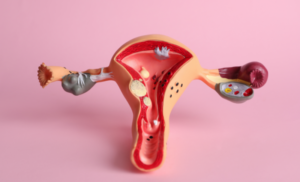Section “Female Only”: Female Hormone Support

Anatomy and Physiology
This section delves into the intricate world of female hormones, emphasizing the role of the endocrine system in regulating reproductive health. It focuses on key components such as the ovaries, which produce estrogen and progesterone, and the hypothalamus-pituitary-ovarian axis, a complex interplay of hormones governing the menstrual cycle.
Importance to Overall Health
Female hormone support is paramount for overall health and well-being, extending beyond reproductive functions to impact mood, energy levels, and bone health. A balanced hormonal environment contributes to menstrual regularity, fertility, and a smoother transition through different life stages.
Dysfunction
Female hormone imbalances can lead to conditions such as polycystic ovary syndrome (PCOS), irregular menstrual cycles, and premenstrual syndrome (PMS). Recognizing signs of hormonal dysfunction, including mood swings, irregular periods, and fertility issues, is crucial for implementing targeted interventions.
Nutritional Component
The nutritional biochemistry of female hormone support focuses on the endocrine system, specifically addressing the regulation of hormones like estrogen and progesterone.
- Estrogen Synthesis: Nutrients play a role in the synthesis of estrogen, a key female sex hormone. Factors such as amino acids, vitamins, and minerals contribute to the regulation of estrogen levels.
- Progesterone Balance: Supporting the synthesis and balance of progesterone is essential for a healthy menstrual cycle. Nutritional components, including certain fats and micronutrients, influence progesterone production.
- Menstrual Cycle Regulation: The interplay of various nutrients influences the regularity and balance of the menstrual cycle, supporting overall female reproductive health.
Science Behind Nutritional Influence
Nutrients and dietary choices significantly impact the nutritional biochemistry of female hormone support:
- Omega-3 Fatty Acids: Found in fatty fish, flaxseeds, and chia seeds, omega-3s may help balance hormone levels and reduce inflammation.
- Vitamin B6: Crucial for hormone metabolism, vitamin B6 is found in foods like poultry, fish, and bananas.
- Iron and Zinc: Adequate levels of iron and zinc support overall reproductive health and are found in foods like lean meats, legumes, and seeds.
- Calcium and Vitamin D: Important for bone health and may have a role in hormonal balance. Dairy products, leafy greens, and sunlight exposure are sources.
- Phytoestrogen-Rich Foods: Soy products and flaxseeds, containing phytoestrogens, may have a modulating effect on estrogen levels.
Supplements
Explore the potential benefits of glandular supplements tailored to your individual health profile by setting up a free 10 minute call with Dr. Kneessi. Otherwise here are some of the most common supplement recommendations for supporting this system.
- B-vitamins (especially B6 and B12): Support energy metabolism and hormonal balance.
- Vitamin D: Essential for overall health and may play a role in supporting female reproductive health.
- Omega-3 Fatty Acids (Fish Oil): Supports cardiovascular health and may have anti-inflammatory effects.
- Calcium and Magnesium: Important for bone health and muscle function.
- Evening Primrose Oil: Contains gamma-linolenic acid, which may support hormonal balance.
These supplements are selected to provide comprehensive support for female reproductive health. It’s crucial to consult with a healthcare professional, especially for individuals with hormonal disorders or taking medications, to ensure the supplements are suitable for individual health needs and do not interfere with prescribed treatments.




